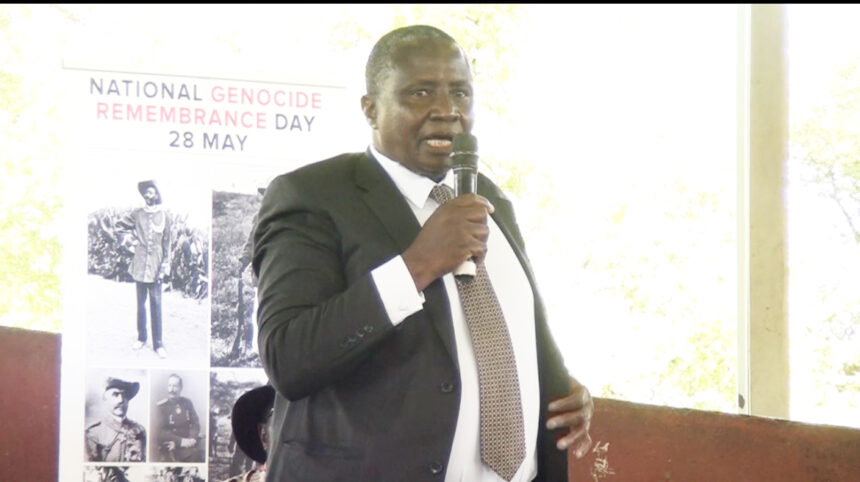Linea Dishena
The Okandjoze Chiefs Assembly rejected the joint declaration between Namibia and Germany on the 1904-1908 Ovaherero/Nama genocide.
The chiefs furthermore called for a national conference with the descendants of the victims and affected communities.
Speaking at their 121st Remembrance Day commemoration at the UN Plaza in Windhoek on Sunday, technical committee member Benestus Kandundu said the chiefs from all 14 regions have distanced themselves from the joint declaration.
The chiefs feel both governments have ignored the demands of the descendants of the genocide victims.
Kandundu said the chiefs are calling on the government to go back to the drawing board, and call for a national conference.
Media reports last week said Cabinet allegedly directed that the joint declaration between Namibia and Germany on reparations for affected communities be signed before March 2025.
“A national conference will be more accommodating for the government to hear more from the descendants. If the government is not listening to the chiefs, how will you bring the reparations in the absence of the chiefs… Who are you representing?” Kandundu questioned.
Speaking on behalf of the Chief’s Assembly, Ambassador Gebhardt Kandanga said the joint declaration has been rejected in total by a broad spectrum of the descendants in Namibia.
This is especially those under the jurisdictions of traditional authorities.
Those in the diaspora have not been included.
“We have distanced ourselves and our communities from roadshows imposed on our communities,” he said.
Sunday marked the 121st anniversary of the start of the armed resistance against German colonial forces.
RDP
Adding his voice to the genocide discourse, Rally for Democracy and Progress (RDP) leader Mike Kavekotora said the joint declaration, with its subsequent amendments fell short of complying with the motion tabled by late Ovaherero paramount chief Kuaima Riruako in 2006.
“The declaration between Germany and the Namibian government cannot possibly be linked to the resolutions taken by our Parliament.
“This declaration is rather a bilateral document that speaks to two resolutions taken by Germany – one in 1989, and another in subsequent years, which aimed at strengthening the two countries’ historic ties,” Kavekotora said in a statement provided to this publication.
He asserted that the declaration was an insult.
“It’s an insult to try and link the so-called joint declaration to the Ovaherero and Nama genocide. Let the joint declaration rather remain a bilateral document, aimed at promoting the two governments’ historic ties. “These governments cannot possibly conclude the genocide negotiations without the full participation of the affected communities and their genuine traditional leaders. The omission of the Mahareros, the Zeraeuas, the Kambazembis, the Riruakos, the Katjiuas, the Thoms, the Hovekas, the Tjingaetes, the Tjavaras and others, is an invalidation of the motion as approved by Parliament,” the economist-turned-politician asserted.
He added “secondly, it is not enough just to change a few words in the declaration to make it compliant with resolutions derived from the late Riruako’s motion.
“Justice to the affected communities can never be attained through the manipulative approach taken by the two governments. Replacing the word grant with reparations is, in effect, an insult to our intelligence while Germany retains the exclusive rights to determine the quantum”.
He continued: “A grant can be determined by the grantor, but reparation is based on losses incurred by the affected communities.
“We lost human lives, we lost cattle, and we lost fertile and productive land. Our people still find themselves in foreign countries. We lost our culture. The Ovaherero and the Nama leaders, who were conveniently excluded from the talks, calculated a quantifiable amount of N$11 trillion. I did a similar calculation, and came very close to that amount.
“I challenged, and am currently challenging, both these governments to come and tell the world how they derived the amount as stipulated in the declaration. I am sure they might have sucked their thumbs to determine the amount”.
From where Kavekotora stands, “the Namibian government, through acceding to this nonsense, has demonstrated their incompetence and a lack of emotional involvement to appreciate the real material and emotional damage caused by the German atrocities to the affected communities.
“That’s why they adopted a ‘don’t care attitude’ toward the genocide talks. Keep in mind that the affected communities waited for so long, and will not settle for less – even if it must take another 100 years to conclude a realistic deal.
“These governments should never underestimate the resolve of these communities in restoring their dignity”.
-Nampa
-Additional reporting by New Era.



